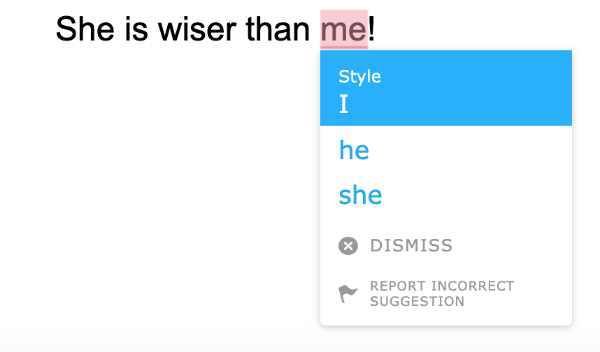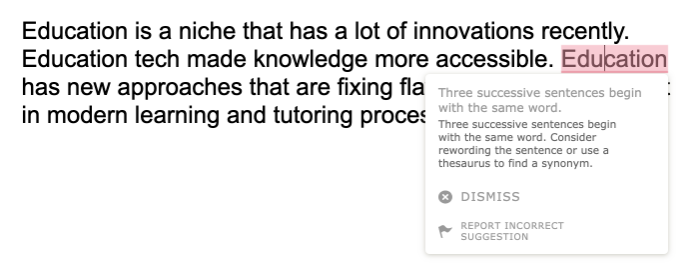How to improve your writing style in English: 5 tips
- Transfer

When writing texts in any language, it is important not only to avoid grammatical and syntactical errors, but also to generally follow the presentation style. Readers instantly see when the text is written well.
I came across interesting material with five tips that are designed to help you quickly improve your writing style. Here is a slightly abridged and optimized version.
1. Do not get used to the use of coordinating unions at the beginning of the proposal
One of the main holivars in the field of English stylistics is the eternal debate about whether or not to start a proposal with the so-called coordinating conjunctions. Simply put, from words like And or But. Many have heard that this is strictly prohibited, “carriers don’t do this”, and so on.
In fact, there is no mistake in starting a sentence with such a word. Everything will be right here. However, experience suggests that such a beginning may be too simple and therefore seductive. As a result, a person can get used to starting sentences like this all the time, and this is not very good in terms of style.
Use them should be in place. Here is an example of such an application of coordinating unions at the beginning of a sentence:
Mary prepared her essay on time. But she forgot to copy the file, and someone deleted it by accident.
If you combine these two sentences into one, then the pause disappears, the stress of the moment decreases:
Mary prepared her essay on time, but she forgot to copy the file, and someone deleted it by accident.
That's when the use of coordinating alliances at the beginning of a sentence may be appropriate.
2. Understand subjective pronouns
The subjective pronoun in English is a pronoun that can act as a subject in a sentence, that is, take on the role that a noun usually plays. And the subject, as we know, is a person or object that in the sentence performs the action described by the verb.
At first glance, everything seems not so complicated, but in practice there are a number of errors that are associated with the use of subjective pronouns. One of the most common is the use of object form where subjective is needed.
Example:
She is wiser than me!
The subjective form of pronouns is the words I, he, she, we and they. They are usually used as subject for the predicate. In this case, I need to use I:

3. Never (almost) start a sentence with a number
Everything is simple here - the figure at the beginning of the sentence does not look very beautiful, although there is no officially recognized error. It would be better to rephrase the sentence so that the figure was not at the beginning, or simply write it in words.
Examples:
Bad : 12 people were injured.
Good : Twelve people were injured.
The second version purely looks better. However, you can’t follow this advice in 100% of cases. If you have - this happens in scientific papers - the figure with the decimal part is at the beginning of the sentence, then if you write it in words, everything will only get worse.
Examples:
Good : 51.45% of marketing professionals said they plan to increase their digital advertising budgets in the upcoming year.
Bad : Fifty-one point forty-five percent of marketing professionals said they plan to increase their digital advertising budgets in the upcoming year.
The second version looks frankly awful, so it's better to just leave it as it is, with the usual number.
4. The main sign of a good style is the read text.
It often happens that, catching a muse by the tail, the author begins to quickly sketch the text. And in such a situation it is extremely important not to forget about the importance of proofreading the material.
After the text is written, you need to reread it with a cold head. In 100% of cases, you will find errors, and missed punctuation marks, and notice stylistic moments that need refinement. One such point is the repetition of words at the beginning of a sentence.

5. Get rid of redundancy
Excessive expressions (redundancies) pollute the text, make it difficult to read, and sometimes give the impression that the author does not fully understand the topic.
There are several types of redundant phrases:
- Adjectives with the same meaning as the word they describe
- Adverbs that repeat the meaning of the verb
- Group of words with identical meanings
In general, you can notice the redundancy in a sentence like this: ask yourself if it contains two or more words with a similar or identical meaning. If there are such words, try mentally leaving only one of them - if the meaning of the phrase is not lost, we have redundancy.
Examples:
Bad : Employees were delivering their best results approximately about 12 working days per month.
In this case, the words “approximately” and “about” mean “approximation” of the calculations, so that you can leave only one of these words.
Good : Employees were delivering their best results approximately 12 working days per month.
What do you think about the tips? Are there any other ways to quickly upgrade my writing style in English?
